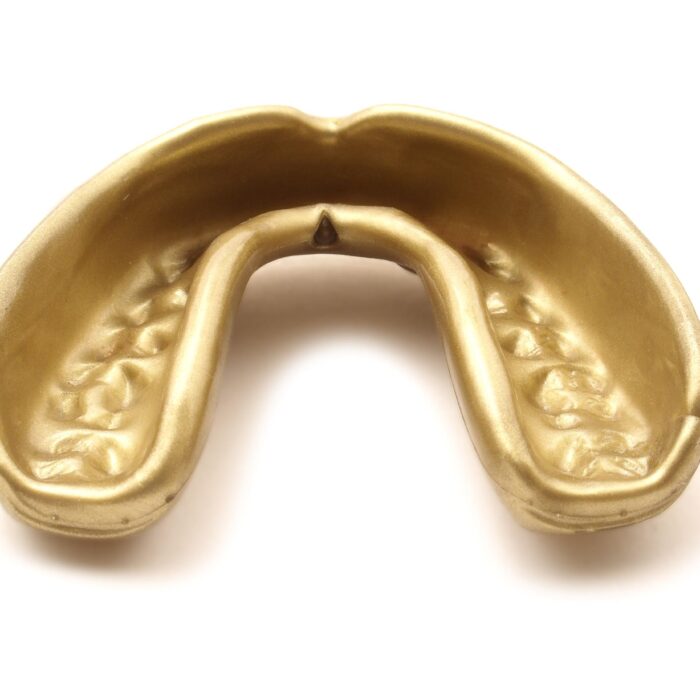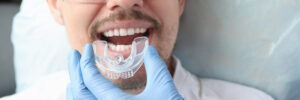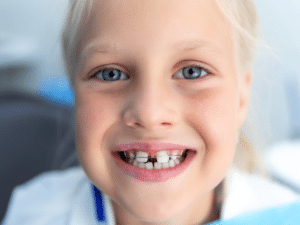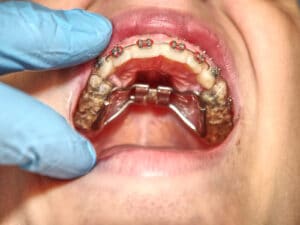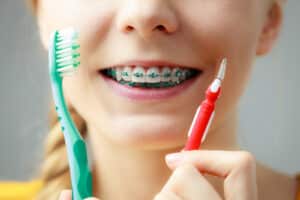Sports come with risks, and dental injuries are among the most common. Mouthguards for athletes provide essential protection, reducing the chance of broken teeth, jaw injuries, and soft tissue damage. From contact sports like football to non-contact activities like gymnastics, athletes of all levels benefit from wearing one. Choosing the right mouthguard depends on the sport, level of play, and personal comfort.
The Importance of Mouthguards for Athletes
Mouth injuries can happen fast, and recovery is often painful and expensive. A properly fitted mouthguard acts as a barrier, helping to absorb impact and protect the teeth, gums, and jaw.
Common Dental Injuries in Sports
Without protection, athletes risk:
- Chipped or broken teeth – A direct hit to the mouth can fracture teeth, leading to costly dental repairs.
- Tooth loss – Hard impacts may knock out a tooth completely, requiring emergency treatment.
- Jaw fractures – Some injuries extend beyond the teeth, damaging the jawbone.
- Soft tissue injuries – The lips, tongue, and inner cheeks can be cut or bruised from sudden force.
Sports That Require Mouthguards
Mouthguards are a must in high-contact sports but are also beneficial for other activities.
High-Contact Sports
Athletes in these sports face a higher risk of mouth injuries:
- Football
- Hockey
- Boxing
- Martial arts
- Lacrosse
- Rugby
Moderate-Contact Sports
While not as aggressive as high-contact sports, these still involve risks:
- Basketball
- Soccer
- Wrestling
- Baseball/Softball
Non-Contact Sports with Risk of Falls or Impact
Even non-contact sports can cause mouth injuries due to falls or accidental collisions:
- Gymnastics
- Cycling
- Skateboarding
- Weightlifting
Beyond Just Teeth Protection
Mouthguards do more than prevent broken teeth. They help stabilize the jaw, reducing the chance of concussions from impact. They also protect braces and other dental work from damage. A well-fitted mouthguard makes breathing and speaking easier while playing, allowing athletes to focus on performance without discomfort. Protecting your teeth and jaw should be a priority for every athlete.
Different Types of Mouthguards for Athletes
Not all mouthguards offer the same level of protection. The right choice depends on the sport, fit, and personal preference. Some provide basic coverage, while others are designed for high-impact sports.
1. Stock Mouthguards
- Pre-formed and sold in a standard size
- Least expensive but often uncomfortable
- Can be bulky and may not stay in place well
- Limited protection due to poor fit
2. Boil-and-Bite Mouthguards
- Made from thermoplastic material that softens in hot water
- Molds to the teeth for a better fit than stock versions
- Offers a balance between affordability and protection
- Available in sporting goods stores and widely used by athletes
3. Custom-Fit Mouthguards
- Created by a dentist for a precise fit
- Offers the highest level of comfort and protection
- Allows easier breathing and speaking during play
- Best choice for serious athletes and those with braces
Which One Is Best?
The best option depends on the level of contact in the sport and personal comfort. Custom-fit mouthguards for athletes provide the most protection, but boil-and-bite models are a solid alternative for those looking for a better fit than stock options. Athletes in high-impact sports should consider investing in a custom design for maximum safety. Choosing the right mouthguard ensures better performance and fewer risks.
Choosing the Right Mouthguard Based on Sport
Different sports require different levels of protection. The intensity of contact, risk of impact, and duration of wear all influence which mouthguard works best. Some athletes need a thicker, high-impact design, while others benefit from a more flexible option.
High-Impact Sports (Football, Boxing, Hockey, MMA, Rugby)
Athletes in these sports face frequent direct hits, making strong protection essential.
- Recommended Mouthguard: Custom-fit or high-quality boil-and-bite
- Key Features:
- Extra thickness for shock absorption
- Secure fit to prevent dislodging during intense play
- Reinforced material to withstand repeated impacts
Moderate-Contact Sports (Basketball, Soccer, Lacrosse, Wrestling, Baseball/Softball)
While not as aggressive as high-impact sports, these involve risks from accidental collisions, elbows, or falls.
- Recommended Mouthguard: Boil-and-bite or custom-fit
- Key Features:
- Slimmer profile for comfort and breathability
- Adequate cushioning to absorb unexpected contact
- Durable enough to handle fast movements and minor impacts
Non-Contact Sports with Risk of Falls or Accidental Impact (Gymnastics, Cycling, Skateboarding, Weightlifting)
Even without direct player contact, falls and equipment-related accidents can cause dental injuries.
- Recommended Mouthguard: Thin custom-fit or lightweight boil-and-bite
- Key Features:
- Lightweight for minimal interference
- Comfortable for extended wear
- Just enough protection to prevent minor injuries
Mouthguards for Athletes with Braces
Braces require additional protection to prevent cuts inside the mouth and safeguard orthodontic work.
- Best Option: Custom-fit mouthguards designed specifically for braces
- Why?
- Extra space for brackets and wires
- Smooth interior to reduce irritation
- Stronger material to absorb impact without damaging braces
Wearing the right mouthguard for the sport can prevent serious injuries while allowing athletes to perform comfortably.
Key Features to Look for in Mouthguards for Athletes
Not all mouthguards offer the same level of comfort and protection. The right one should provide a secure fit, allow easy breathing, and last through the demands of the sport. Here are the most important features to consider.
1. Proper Fit and Comfort
- Should stay in place without constant adjustment
- Must cover the teeth and gums without feeling bulky
- Should not interfere with speaking or breathing
2. Breathability and Ease of Communication
- Allows athletes to breathe naturally during play
- Should not block airflow or cause excessive salivation
- Enables clear speech for team communication
3. Durable Materials for Longevity
- Shock-absorbing materials reduce impact force
- Tear-resistant to withstand repeated use
- Non-toxic and free of harmful chemicals
4. Thickness and Coverage Based on Sport
- High-impact sports: Thicker mouthguards with reinforced layers
- Moderate-contact sports: Medium thickness for a balance of comfort and protection
- Non-contact sports: Lightweight design for occasional impact protection
5. Hygiene: How to Clean and Store Your Mouthguard
- Rinse before and after each use
- Clean regularly with mild soap and water
- Store in a ventilated case to prevent bacteria buildup
- Avoid leaving it in hot environments, as heat can warp the material
A well-designed mouthguard improves both safety and performance. Choosing one with the right features ensures long-term protection without discomfort.
Custom vs. Over-the-Counter Mouthguards: Which One is Best?
Mouthguards come in different forms, but the choice often comes down to custom-fit models or store-bought options. Each type has advantages and drawbacks, depending on the athlete’s needs, budget, and level of play.
1. Stock Mouthguards (Over-the-Counter)
- Pre-formed and sold in a one-size-fits-all design
- Least expensive but often uncomfortable
- Bulky and may not stay in place during movement
- Provides minimal protection due to poor fit
2. Boil-and-Bite Mouthguards
- Softens in hot water and molds to the teeth for a better fit
- More comfortable than stock mouthguards
- Provides moderate protection but wears out faster
- Popular choice for youth and amateur athletes
3. Custom-Fit Mouthguards
- Made by a dentist for a precise, personalized fit
- Offers the highest level of comfort and protection
- Easier to breathe and speak while wearing
- Best choice for serious athletes and those with braces
Which One Should You Choose?
- For occasional or youth athletes: Boil-and-bite models offer decent protection at an affordable price.
- For competitive or high-contact sports: Custom-fit mouthguards provide the best defense against injuries.
- For athletes with braces: A custom mouthguard is the safest option to prevent damage to brackets and wires.
Investing in a high-quality mouthguard can make a difference in long-term dental health. Choosing the right type ensures better protection, comfort, and durability.
FAQs About Mouthguards for Athletes
Many athletes have questions about how to choose, use, and maintain a mouthguard. Here are some of the most common concerns.
1. How Often Should You Replace a Mouthguard?
- Most mouthguards last one season before needing replacement.
- If it becomes loose, torn, or worn down, it should be replaced sooner.
- Athletes with braces may need a new mouthguard more frequently as their teeth shift.
2. Can You Wear a Mouthguard with Braces?
- Yes, but it should be a custom-fit mouthguard designed for braces.
- It must have extra room to protect brackets and wires.
- A dentist or orthodontist can provide the best option.
3. What’s the Best Way to Clean a Mouthguard?
- Rinse with water before and after each use.
- Clean with mild soap and a toothbrush regularly.
- Avoid using hot water, which can warp the material.
- Store in a ventilated case to prevent bacteria buildup.
4. Do Younger Athletes Need Different Mouthguards Than Adults?
- Yes, youth mouthguards are designed for smaller mouths.
- Kids and teens may need replacements more often as their teeth grow.
- A custom-fit mouthguard ensures proper protection during orthodontic changes.
5. Can a Mouthguard Help Prevent Concussions?
- While it won’t fully prevent concussions, a well-fitted mouthguard helps absorb impact.
- It reduces jaw movement, which may lower the risk of head injuries.
- Some high-impact sports require players to wear them for extra safety.
A quality mouthguard is a simple yet essential piece of protective gear. Wearing and maintaining one properly ensures long-term benefits. Next, the importance of choosing the right mouthguard will be summarized.
Conclusion: Protect Your Smile with the Right Mouthguard
Mouthguards for athletes are more than just a precaution—they are essential for preventing dental injuries and ensuring long-term oral health. Choosing the right type depends on the sport, level of impact, and personal comfort.
- Stock mouthguards provide basic protection but often lack comfort and security.
- Boil-and-bite options offer a better fit and are ideal for recreational athletes.
- Custom-fit mouthguards provide the highest level of protection, especially for those in high-contact sports or wearing braces.
Beyond protecting teeth, a well-fitted mouthguard helps stabilize the jaw and reduce the risk of soft tissue injuries. Athletes of all ages should prioritize wearing one to avoid costly dental repairs and unnecessary pain.
Investing in a quality mouthguard ensures safer play, better performance, and long-term protection. Choosing the right one today can prevent serious injuries in the future.
Protect Your Smile with Expert Orthodontic Care
A properly fitted mouthguard is a key part of protecting your teeth during sports. But maintaining a healthy, well-aligned smile goes beyond just injury prevention. At Dr. Bob Bryan Orthodontics, we provide advanced orthodontic care designed to give every patient the confidence of a strong, healthy smile.
Our team is dedicated to creating a comfortable and personalized experience for patients of all ages. With cutting-edge technology like Invisalign, digital scans, and advanced imaging, we ensure precise, effective treatments that fit your needs. Whether you’re considering braces, clear aligners, or other orthodontic solutions, we are here to guide you every step of the way.
Start your journey to a healthier, more confident smile today. Contact Dr. Bob Bryan Orthodontics to schedule a consultation and take the first step toward expert orthodontic care.

